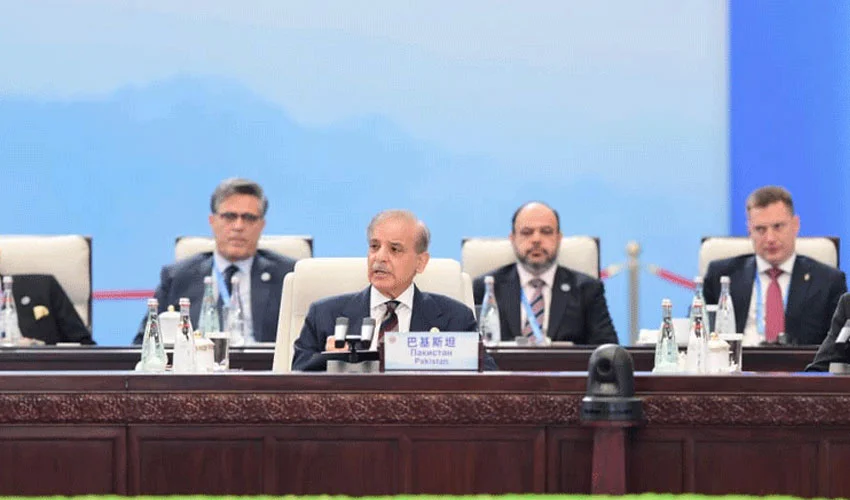Prime Minister Shehbaz Sharif, while addressing the SCO Summit in Tianjin, issued a strong warning about foreign involvement in terrorist attacks across Pakistan. He pointed to undeniable evidence linking external forces to violence in Balochistan and Khyber Pakhtunkhwa, including the deadly attack on Jaffar Express.
The premier stressed that terrorism and extremism are not confined to one nation. He said they threaten the entire region and must be addressed collectively. Shehbaz Sharif urged the global community to hold both the perpetrators and their facilitators accountable.
Foreign Involvement in Pakistan Terror Attacks
Shehbaz Sharif told the Shanghai Cooperation Organization meeting that some countries have used terrorism as a political weapon. He rejected what he described as their “false narratives,” declaring that these no longer hold credibility. He reminded the forum of Pakistan’s sacrifices in the war on terror, saying the country has lost over 90,000 lives. “Those behind these heinous crimes must face justice,” he added.
Dialogue for South Asian Peace
At the SCO gathering, the prime minister underlined that Pakistan seeks dialogue, not confrontation, with its neighbours. He said comprehensive talks are vital for lasting peace in South Asia. He reaffirmed that Pakistan respects the sovereignty and territorial integrity of all member states.
“Pakistan has always believed in dialogue, diplomacy, and multilateralism,” Shehbaz noted. “We honour international and bilateral agreements and value sovereignty as the most important principle for any country.”
The prime minister stressed the need for stability in Afghanistan, calling it crucial for regional peace and prosperity. He shared that Islamabad is improving ties with Kabul and engaging in trilateral cooperation to strengthen relations.
Support for Palestine and Condemnation of Israel
Shehbaz Sharif also reaffirmed Pakistan’s long-standing position on Palestine. He strongly condemned Israeli aggression in Gaza, terming the humanitarian crisis an “unending wound on our collective conscience.” He said a two-state solution, endorsed by the United Nations, is the only path to peace in the Middle East.
He further declared Israel’s recent strikes on Iran “unjustified, condemnable, and unacceptable.” Pakistan, he said, believes comprehensive dialogue can resolve longstanding disputes in the region.
Praise for China and Regional Cooperation
At the Eurasian forum, Shehbaz Sharif praised Chinese President Xi Jinping’s leadership. He called the China-Pakistan Economic Corridor (CPEC) a successful model of cooperation. He noted that unhindered access to water, under existing agreements, would advance SCO objectives.
The premier lauded Tianjin as a symbol of China’s cultural and economic vitality. He said the SCO Summit reflects Pakistan’s consistent commitment to regional integration and mutual progress.
Pakistan’s Resilience Amid Crises
Turning to domestic challenges, Shehbaz Sharif highlighted the devastating floods, heavy rains, and climate disasters caused by global warming. These, he said, claimed lives and damaged property, crops, and infrastructure. Yet, he emphasized that Pakistan has shown resilience with an “impressive economic recovery” over the last 18 months. He cited falling inflation, a current account surplus, and a strong stock market as proof of progress.
“We are paving the way for new hope after the devastation of floods,” he said.
The prime minister ended his address by reaffirming Pakistan’s commitment to the United Nations and SCO Charters. He urged all 3.5 billion citizens of member states to work together for peace, prosperity, and stability.
SCO Tianjin Declaration
Following the 25th Council of Heads of State meeting, the SCO Summit issued its Tianjin Declaration. The statement emphasized respect for sovereignty, territorial integrity, and non-interference in the internal affairs of nations. It also called for reforms in the United Nations to ensure better representation for developing countries.
The declaration urged the adaptation of the UN system to reflect modern political and economic realities. SCO leaders underlined the need to make it a stronger platform for global cooperation and collective security.
Rejection of Bloc Politics
The Shanghai Cooperation Organization meeting also rejected confrontational and bloc-based strategies. Instead, leaders endorsed cooperation to build an inclusive and equal security framework. They reaffirmed the “Shanghai Spirit” of trust, respect for cultural diversity, and shared development.
The declaration concluded by highlighting the need for sustainable peace across Eurasia. Leaders stressed that regional security, economic growth, and cultural exchanges must go hand in hand.


